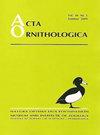西南亚马逊地区竹林混种鸟群的结构和栖地大小
IF 1.3
4区 生物学
Q3 ORNITHOLOGY
引用次数: 4
摘要
摘要混合种鸟群是由两种或两种以上不同种鸟组成的有凝聚力的群体,它们通过群体成员之间系统的行为相互作用来保持队形。通常情况下,混合物种的鸟群会围绕一个核心物种形成,在觅食过程中,这一核心物种会呈现出特定的运动模式,并发出其他物种能识别的鸣声。在新热带森林的林下植被中,拟竹科的代表物种,特别是拟竹属的物种,已经适应了在混合物种群中扮演核心物种的角色。在巴西西南部的瓜多瓦(Guadua)竹林中,我们描述了以蓝板岩蚁(Antshrike Thamnomanes schistogynus)为主导的混合种群。我们在一个600 × 600 m的网格内收集数据,细分为36个1公顷的地块,总面积为36公顷。在这个网格中,我们划定了居住的混合物种群的家园范围和核心区域。我们还确定了每个群的组成、频率、成员的保真度,并确定了混合种群与网格内植被结构的关系。我们划定了8个混种群的活动范围。最小凸多边形法估计的平均家园范围为3.45±0.17 ha,自相关核密度估计法估计的平均家园范围为3.65±0.15 ha,平均核心区面积为1.14±0.03 ha。在亚马逊西南部,以血吸虫为主导的混合种群的栖息地是有记录的最小种类之一。在混合种群中共鉴定出71种鸟类,平均41.1±2.1种。虽然主要种血吸虫的地理分布与西南亚马逊地区的竹林几乎完全一致,但我们的研究结果并未表明该种领导的混合种群与竹林之间存在任何系统关系或保真度。本文章由计算机程序翻译,如有差异,请以英文原文为准。
Structure and Home Range Size of Mixed-Species Bird Flocks in a Bamboo Forest in Southwestern Amazonia
Abstract. Mixed-species flocks of birds are cohesive groups of two or more different species that are kept in formation by systematic behavioral interactions among the members of the flocks. Typically, mixed-species flocks form themselves around a nuclear species, which presents a specific pattern of movement during foraging, and a song that is recognized by the other species. In the understory of Neotropical forests, representatives of the family Thamnophilidae, in particular species of the genus Thamnomanes, have become adapted for the role of nuclear species in mixed-species flocks. In the present study, we describe the mixed-species flocks led by individuals of Bluish-slate Antshrike Thamnomanes schistogynus in a forest dominated by bamboo Guadua sp. in southwestern Brazilian Amazonia. We collected data within a 600 × 600 m grid subdivided into 36 1-ha plots, with a total area of 36 ha. Within this grid, we delimited the home ranges and core areas of the resident mixed-species flocks. We also identified the composition of each flocks, frequency, fidelity of its members and determined the relationship between mixed-species flocks and vegetation structure within the grid. We delimited the home ranges of eight mixed-species flocks. The mean home range, estimated using the Minimum Convex Polygon method, was 3.45 ± 0.17 ha, and estimated using the autocorrelated kernel density estimation method was 3.65 ± 0.15 ha, and the mean core area, 1.14 ± 0.03 ha. The home ranges of the mixed-species flocks led by T. schistogynus in southwestern Amazonia are among the smallest recorded in species of the genus Thamnomanes. We identified 71 different bird species in the mixed-species flocks with a mean of 41.1 ± 2.1. While the geographic distribution of the lead species T. schistogynus coincides almost exactly with that of the bamboo forests of southwestern Amazonia, our results did not indicate any systematic relationship or fidelity between the mixed-species flocks led by this species and the bamboo forest.
求助全文
通过发布文献求助,成功后即可免费获取论文全文。
去求助
来源期刊

Acta Ornithologica
生物-鸟类学
CiteScore
2.10
自引率
0.00%
发文量
14
审稿时长
>12 weeks
期刊介绍:
Publishes scientific papers (original research reports, reviews, short notes, etc.) and announcements from all fields of ornithology. All manuscripts are peer-reviewed.
Established in 1933 as Acta Ornithologica Musei Zoologici Polonici, since 1953 continued under the present title.
Published twice a year by the Natura Optima Dux Foundation under the auspices of the Museum and Institute of Zoology, Polish Academy of Sciences.
 求助内容:
求助内容: 应助结果提醒方式:
应助结果提醒方式:


